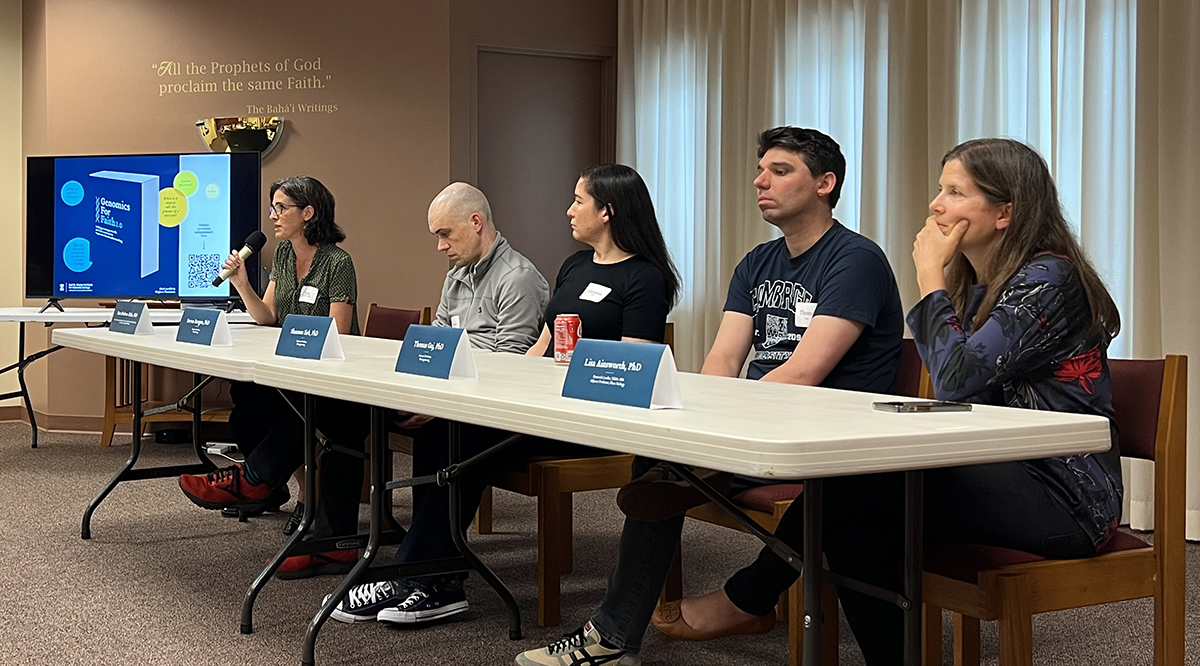Genomics for Faith discusses gene editing with local faith communities

A panel at the event discussed the implications, ethical considerations, and misconceptions of gene editing tools and technologies. / Mirhee Lee
Technological advancements in genomics have led to major developments in the areas of medicine, energy, and agriculture, that are impacting society at large. Due to the pace of these developments, many professional sectors of society lack the tools and genomics knowledge necessary to understand how this new research may affect them. The Genomics for Professionals program, otherwise known as Genomics forTM, was created by the outreach team at the IGB to help different sectors of society gain a better understanding of basic concepts in biology and advancements in genomics as a whole.
The program involves a series of workshops that provide a space for participants to ask questions and have discussions with scientists regarding the impact genomics may have on their sector’s line of work. Workshops may focus on different topics relevant to the job, or allow participants to conduct hands-on genomic activities to better grasp the science behind it. The program has already featured several workshops catered to a diverse set of sectors, including judges, lawyers, clinicians, journalists, police officers, and more.
This year saw the start of the Genomics for Faith program, a new series of workshops that focus on bringing scientists and faith communities together to discuss meaningful, and sometimes controversial, topics in genomics. The goal for this particular series is to promote a dialogue between scientists and faith communities about genomic technologies, to gain a shared understanding for how these may intertwine within their lives and faiths. The first installation of the program took place in May 2023 at the Channing-Murray Foundation, where a crowd gathered to discuss perspectives on “what constitutes life?” and consequently, “what is death?”
The second workshop in the series occurred on September 7th, 2023 at the Baháʼí Center in Urbana, where a new topic was posed to participants – gene editing. Gene editing is the process by which a targeted part of an organism’s DNA is added, removed, or altered. After a brief introduction on gene editing by Dan Urban, IGB Senior Outreach Activities Coordinator and one of the organizers of the program, participants were broken into discussion groups based on three major taxa – microbes, plants, and animals. Within each group were scientific representatives whose research focused on the group’s specific taxa.
“Our goal was to delve into a topic that is important, but that some members of the general public may find more controversial—editing the very foundational building blocks of a living creature,” said Urban.
The groups were prompted with discussion questions such as “when is it ok to edit a genome?” “are there organisms that gene editing is more acceptable in and why?” and “how do we reach a consensus on when and how to use a new technology, like gene editing?”
These discussions prompted further ethical considerations, such as whether gene edits that could occur naturally (making plants grow bigger fruits, for example) were seen as more acceptable among the population than edits that could not occur naturally in nature (placing the human gene for producing insulin inside of bacteria). This also led to a fruitful discussion on weighing the risk of a new technology versus the reward of using it to save lives.
Afterwards, participants were given a chance to ask a panel of scientists any questions they had. The panel addressed misconceptions and fears of the technology being misused, and detailed how they were each training the students in their labs to utilize gene editing tools in a safe and ethical way. Many panel members gave examples of beneficial uses of gene editing in their own line of research, including but not limited to: the production of medicines via gene-edited microbes, gene therapies to fix otherwise terminal diseases, the creation of animal models to research cures for cancer, and the alteration of plants to produce more food and energy.
Participants inquired about areas of concern for scientists in the field, which led to conversations surrounding current regulations, containment of altered microbes/plants, and ensuring that the technology is not weaponized in any way.
According to the post-event survey, most participants walked away with a better understanding of gene editing, and its uses and limitations. Many participants thought the dialogue was positive, and that they were now more informed about the technology.
After the first workshop, which featured a whole-room question and answer session with a panel of experts, participants indicated that they wanted smaller, more intimate group conversations. For the second workshop, this smaller group format was implemented.
“The new discussion format allowed for extra time for close-knit discussions among smaller groups, which led to some great conversations between the scientists and community faith leaders,” said Urban. “I think participants got a better sense of how deeply scientists consider the safety implications and ethical questions that come with this technology.”
More Genomics for Faith workshops are being planned for the future. Any comments on past workshops or suggestions for new workshop topics, please contact Claudia Lutz, IGB Outreach Manager, at cclutz2@illinois.edu.
